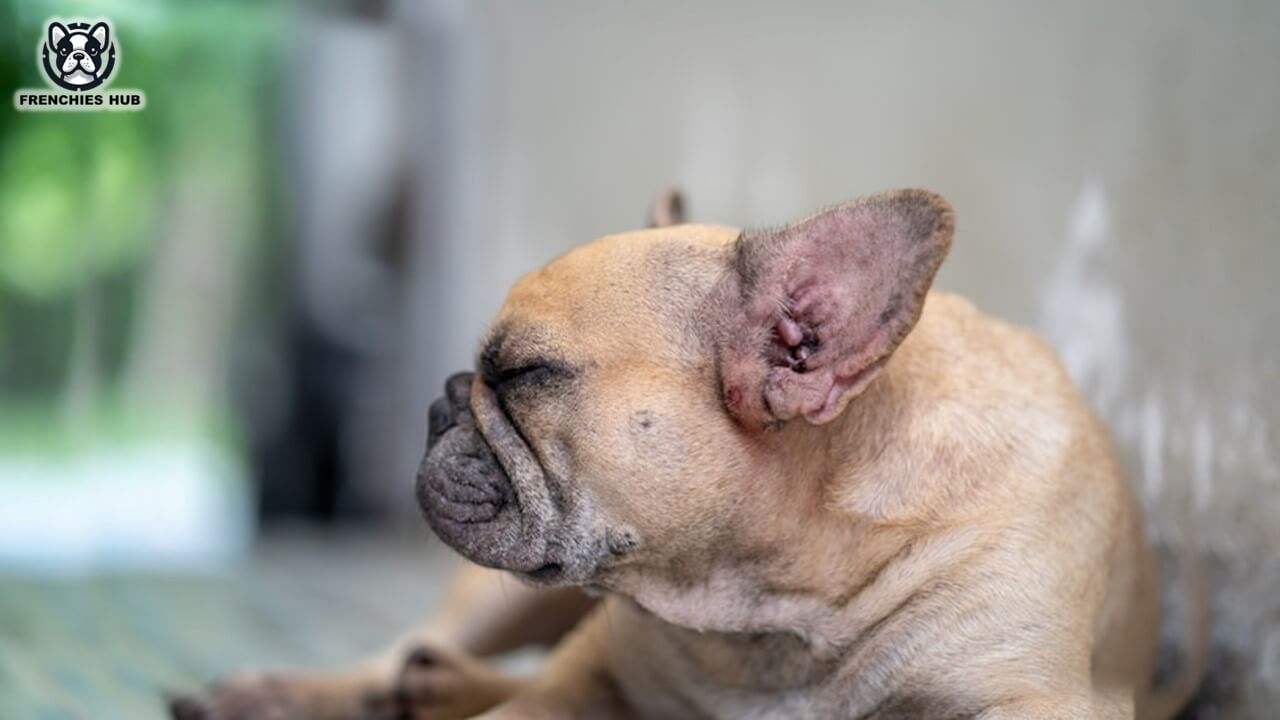As a devoted dog-lover who has navigated the challenges of pet allergies, my journey to understanding which breeds could share my home without triggering a sneezing marathon or itchy eyes has been exhaustive. Among the myriad of pooch options, the French Bulldog often pops up in discussions—its beloved status affirmed by the American Kennel Club as one of the most popular breeds. However, the truth about these cute and cuddly pups being hypoallergenic is more complex than it seems.
Despite their charming demeanor and adaptability with humans, Frenchies carry a misconception about their compatibility with allergy sufferers. Many prospective owners, eager to adopt a new family member, often ask, “Are French Bulldogs hypoallergenic?” The answer is nuanced. While no dog is truly hypoallergenic, some breeds are touted as more allergy-friendly. Unfortunately, French Bulldogs do not fall into this category due to their shedding habits which can contribute to allergic reactions.
Understanding the nature of allergies—which often stem from pet dander—highlights why managing exposure is crucial. Although French Bulldogs are not the ideal choice for those severely affected by allergies, their moderate shedding habits can be managed to some extent, offering a glimmer of hope for those mildly allergic. Engaging in regular grooming sessions and maintaining a clean home environment minimizes the accumulation of allergens, making life with a French Bulldog more feasible for some.
Throughout my own experiences and those of other dog-lovers, the joy of petting and bonding with a French Bulldog often outweighs the challenges for many. However, potential owners should be prepared with strategies to reduce allergic reactions, ensuring a happy coexistence with their furry friend.
Hypoallergenic Status of French Bulldogs: Fact or Fiction?
When exploring the hypoallergenic status of French Bulldogs, it’s critical to acknowledge that they are generally not recommended for individuals with severe allergies. These adorable dogs captivate many with their sociable nature and compact size, yet they pose notable challenges for those sensitive to pet allergens.
Understanding the nature of allergens in dogs is vital for maintaining a comfortable living environment. Contrary to popular belief, no breed is completely hypoallergenic, and French Bulldogs are no exception. They harbor allergens in their saliva, fur, and dander, which are common triggers for allergic reactions.
For those suffering from breathing issues or heightened sensitivity to pet dander, owning a French Bulldog may exacerbate their symptoms. These pups may trigger an allergic reaction through simple actions like a sneeze or a cuddle. The fur of a French Bulldog can retain traces of allergens that easily transfer during physical contact.
Despite their popularity and endearing qualities, French Bulldogs may not be the ideal choice for homes where allergies are a concern. Being aware of the allergic risks associated with this breed can help potential owners make well-informed decisions about integrating a dog into their family.
Understanding Hypoallergenic: What Does It Really Mean?
The term hypoallergenic often comes up in conversations about allergies related to pets, particularly when people are considering adding a dog to their family who suffer from adverse reactions to animals. Being hypoallergenic implies that an animal does not produce substances known as allergens that could trigger an overactive immune system response in humans.
Despite the popularity and affection for French Bulldogs, labeling them as hypoallergenic can be somewhat misleading. These charming dogs naturally produce proteins in their saliva, fur, and skin, which accumulate to become particles of dander. This dander, along with shed hair and dry skin flakes, becomes a potent source of allergens, capable of eliciting an immune response when they make contact with a person’s skin.
Known for their shedding, French Bulldogs continually release hair that can carry these allergenic particles throughout an owner’s home. Although they are undeniably adorable, their coat characteristics and shedding qualities make them challenging for individuals with severe allergy sensitivities. Hence, while they might be safe for some families, they do not universally qualify as hypoallergenic for everyone, especially for those who are sensitive to the typical harmless substances found in pets.
Exploring Hypoallergenic Dog Breeds: Reality or Myth?
The term hypoallergenic is often thrown around in discussions about dog breeds that are suitable for individuals with allergies. It suggests that certain breeds might be safer for allergy sufferers due to their minimal shedding or reduced saliva production, which are common triggers of allergic reactions.
Despite the appealing notion, it’s important to understand that no dog breed, including the popular Frenchies with their short hair and small size, is completely hypoallergenic. These dogs are often considered low maintenance, yet they can still carry allergens that trigger reactions in sensitive individuals.
Before bringing a dog into a home affected by allergies, consulting a vet is a critical step. This professional advice can help potential dog owners understand the realities of living with pets and manage expectations regarding hypoallergenic claims. Such guidance is invaluable for ensuring that both the pet and its owner are set up for a successful, healthy relationship.
Assessing Hypoallergenic Traits in French Bulldogs
Despite their popularity and affectionate nature, French Bulldogs may not be the best choice for allergy sufferers. It’s important to dive deep into what hypoallergenic really means in the context of this specific breed.
Shedding and Coat Characteristics
French Bulldogs are often mistaken for being low shedders due to their short-haired coats. However, they do shed a small amount of hair regularly and a large amount biannually, particularly in the late fall and spring seasons. This shedding includes their fur and coat, which can be a concern for those with allergies.
Dietary and Environmental Influences
The health of a French Bulldog’s skin can be significantly affected by their diet and hygienic conditions. Poor diet and environments can lead to skin inflammation, exacerbated by their susceptible skin folds, making them more prone to issues and possibly worsening allergy conditions in sensitive individuals.
Allergic Reactions and Sensitivity
Despite their charming appearance, French Bulldogs can pose a real challenge for individuals with allergies. These dogs commonly shed, and during seasons of excessive shedding, they require special care. Potential owners should exercise caution and consider their own sensitivity to pet dander.
Saliva and Drooling Concerns
French Bulldogs are known for their affectionate and friendly nature, often slobbering with a happy-go-lucky attitude. Unfortunately, their saliva contains proteins that can spread allergens, making their constant drooling throughout the entire year a constant threat for allergy sufferers.
Hair and Dander Issues
The small and tough hair of French Bulldogs means that dander can easily get caught in it. As these dogs often remain close to their owners, they can spread allergens effectively, exacerbating allergic reactions even in less sensitive individuals.
General Allergy Information
If you’re allergic to dogs, having a French Bulldog won’t necessarily “kill your immune system,” but they can cause reactions that are both uncomfortable and potentially painful.
What If You Love French Bulldogs But Worry About Allergies?
If you’re enamored with French Bulldogs but concerned about potential allergies, there are proactive steps you can take to manage these issues effectively while enjoying life with your furry friend.
Comprehensive Grooming Strategies to Combat Allergies
Regular and thorough grooming plays a pivotal role in managing allergic reactions for dog owners. Frequent bathing and brushing of your Frenchie’s coat with a medium bristles brush helps minimize the shedding of dead hair and skin irritants. Implementing these routines can significantly reduce the presence of allergens in your home. Always use gloves and a face mask to shield yourself from allergic reactions during grooming sessions.
Hygiene and Health Maintenance for French Bulldogs
Ensuring that your Frenchie’s facial skin, particularly around the eyes and mouth, remains clean and healthy is crucial for preventing infections and reducing allergens. Trimming their nails regularly helps alleviate stress on their sensitive paws and decreases their tendency to scratch or bite, which can trigger allergies in humans.
Nutritional Management and Environmental Control for Allergy Prevention
Adopting a proper diet enriched with vitamins from high-quality food significantly aids in reducing shedding, a common allergen source. It’s also critical to maintain allergen-free zones, particularly in areas like your bedroom. Keep your Frenchie off the bed and ensure that sheets and other items they contact are cleaned regularly.
Acclimatization and Adjustment Before Adopting a French Bulldog
Before making a long-term commitment, spend some time getting to know a Frenchie to gauge how well you can coexist. This preparatory phase is essential for learning about your compatibility with the breed and managing expectations regarding living with a French Bulldog as a new family member.
Conclusion
While French Bulldogs, affectionately known as Frenchies, are beloved for many reasons, being hypoallergenic is not one of them. These charming dogs are indeed minimal shedders, which can be a significant advantage for those looking to keep their homes relatively free of dog hair. However, it’s important to note that minimal shedding does not equate to being hypoallergenic.
For families still undecided about whether a Frenchie is the right fit, especially concerning allergies, it’s wise to consult with a vet. A veterinarian can provide tailored advice and guide you through understanding how this breed might affect your family’s allergy sensitivities, helping you make a well-informed decision.

